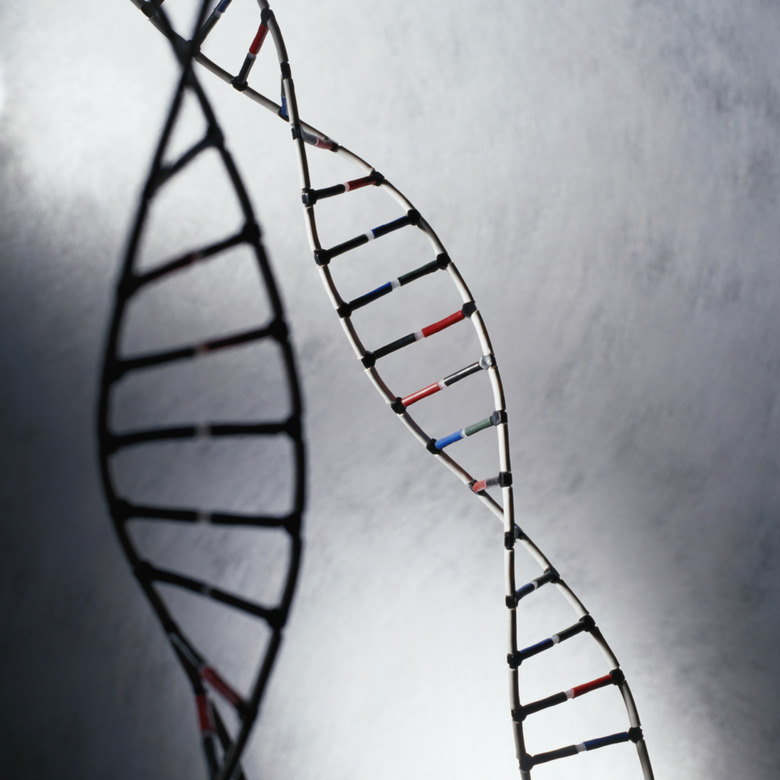The Advantages Of Having A Large Number Of Chromosomes
Having a large number of chromosomes can be advantageous if the organism has a complete extra set of chromosomes. Having extra sets of chromosomes compared to other species that have the same but fewer sets is called being polyploid. Organisms are constantly under assault from their environment. Having extra sets of chromosomes makes them better able to cope with the pressures that threaten to wipe them out.
The Meaning of Ploidy
The Meaning of Ploidy
Each organism has a normal set of chromosomes in each adult cell. Ploidy describes the number of "sets of chromosomes," not the number of individual chromosomes, that an organism has. The term euploid describes the normal number of sets that an organism should have — each organism has its own euploidy number. The term polyploidy describes organisms that have more than the normal set of chromosomes. Diploid means it has twice the normal set of chromosomes. Triploid means it as three times the normal set; and so on and so forth. Being polyploidy means that an organism has extra copies of a gene compared to the euploid organism since each chromosome carries a version of a gene. Polyploidy is commonly found in plants, some types of fish and some types of amphibians.
Heterosis
Heterosis
The first advantage of being polyploidy and having large numbers of chromosome sets is called heterosis, or hybrid vigor. It describes the situation in which a hybrid organism that results from the mating of two parents is better able to survive than either parent. Organisms from different species normally cannot mate with each other, but sometimes they do and produce what is called a hybrid. Hybrids often are weak, die, or are infertile but sometimes can be stronger than their parents. Heterosis can be observed in polyploid hybrids that came from euploid parents.
Gene Redundancy
Gene Redundancy
The second advantage of being polyploid is that the organism has extra copies of genes that can be mutated without harming the organism. Mutations are changes in the code of a gene, which produces faulty proteins that don't do their job within the cell. Mutations can occur through the normal process of copying DNA before dividing a cell or through radiation that damages DNA. However, polyploid organisms have many copies of a gene, so if one of them is mutated and produces a broken protein machine the other copies still make good proteins that keep the cell alive.
Self-Fertilization and Asexual Reproduction
Self-Fertilization and Asexual Reproduction
The third advantage of being polyploid is that organisms can suddenly reproduce asexually, meaning without having to have sex with another organism of an opposite gender. Sexually reproducing organisms produce gametes — sperm, pollen or eggs — that need to fuse in order to form a new organism. Gametes only fuse and successfully form a cell if they recognize the protein markers on each other's surface and if they have the same number of chromosomes. Otherwise, the newly formed cell often dies. Polyploidy can allow an organism to fertilize itself, since gametes can suddenly recognize each other.
Cite This Article
MLA
Ph.D., David H. Nguyen,. "The Advantages Of Having A Large Number Of Chromosomes" sciencing.com, https://www.sciencing.com/advantages-having-large-number-chromosomes-23833/. 24 April 2017.
APA
Ph.D., David H. Nguyen,. (2017, April 24). The Advantages Of Having A Large Number Of Chromosomes. sciencing.com. Retrieved from https://www.sciencing.com/advantages-having-large-number-chromosomes-23833/
Chicago
Ph.D., David H. Nguyen,. The Advantages Of Having A Large Number Of Chromosomes last modified August 30, 2022. https://www.sciencing.com/advantages-having-large-number-chromosomes-23833/
